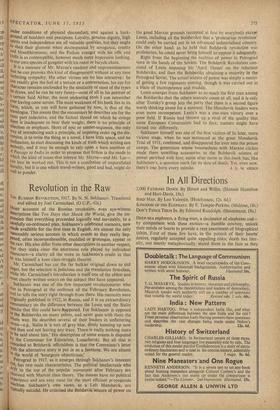Revolution in the Raw
IRE RUSSIAN REVOLUTION, 1917. By N. N. Sukhanov. Translated and edited by Joel Carmichael. (O.U.P., 42s.) Mos-r accounts of the Russian revolution, even eye-witness descriptions like Ten Days that Shook the World, give the im- pression that everything proceeded logically and inevitably, to a carefully co-ordinated plan. Sukhanov's celebrated memoirs, now
made available for the first time in English, arc almost the only
reasonably serious account in which events as they really hap- pened, often incomprehensible, muddled or grotesque, appear in the raw. His also differ from other descriptions in another respect, that they make clear the enormous role played by individual characters—a clarity all the more to Sukhanov's credit in that he was himself a keen class-struggle theorist.
Mr. Carmichael has cut the far bulkier original down to 668 Pages, but the selection is judicious and the translation first-class, while Mr. Carmichael's introduction is itself one of the ablest and most clearly written essays on the subject that have appeared.
Sukhanov was one of the few important revolutionaries who Was in Petrograd at the outbreak of the February Revolution, 'tad he tells the story right through from there. His memoirs were originally published in 1922, in Russia, and it is an extraordinary commentary on the difference between the Lenin and the Stalin epochs that this could have happened. For Sukhanov is opposed to the Bolsheviks on many points, and never goes with them the Whole way. He describes several of their leaders in unflattering terms—e.g., Stalin is 'a sort of grey blur, dimly looming up now
and then and not leaving any trace. There is really nothing more ,to he said about him.' His description of sonic events is disputed
nY the Commissar for Education, Lunacharski. But all that is conceded to Bolshevik officialdom is that the Commissar's letter With the alternative story is put in as a footnote. We arc almost In the world of 'bourgeois objectivism.' Petrograd in 1917. as it emerges through Sukhanov's innocent has two main characteristics. The political intellectuals who drift to the top of the popular movement after February are the good Marxist grounds (accepted at first by everybody except Lenin, including all the Bolsheviks) that a 'proletarian revolution' could only be carried out in an advanced industrialised country. On the other hand, as he held that Bolshevik revolution was proletarian, he could never bring himself to oppose it adequately.
Right from the beginning the realities of power in Petrograd were in the hands of the Soviets. The Bolshevik Revolution con- sisted of Lenin imposing his 'April Theses' on the reluctant Bolsheviks, and then the Bolsheviks obtaining a majority in the Petrograd Soviet. The actual seizure of power was simply a matter of getting a few regiments moving, though it was carried out in a blaze of incompetence and muddle.
Lenin emerges from Sukhanov as so much the first man among the Bolsheviks that the others scarcely count at all, and it is only after Trotsky's group join the party that there is a second figure worth thinking about for a moment. The Menshevik leaders were even more incompetent. Lenin's was a one-man victory over a poor field. It' Russia had thrown up a rival of the quality that some European Communists had to face, matters might have turned out differently.
Sukhanov himself was one of the first victims of its later, more vicious stage, when he was sentenced at the great Menshevik Trial of 1931, confessed, and disappeared for ever into the prison camps. The generation whose besottedness with Marxist clichtis made them unwilling accessories to the Bolshevik seizure of power perished with him; name after name in this book has, like Sukhanov's, a question mark for its date of death. Yet, even now.


































 Previous page
Previous page